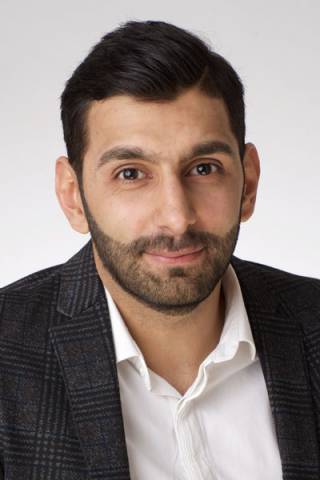Talha Sami, Philosophy, Medicine and Society IBsc

UCL is a world-renowned institution, so for me it was about the prestige and the availability of resources. It was also the course - I think that that swung it for me because it was quite unconventional - typically not what medics would do. Medics are very brainy people, and their focus tends to be on the science whereas this course had a strong element of the humanitarian aspect.
What was it like to study in London?
I spent many years in London during my studies and I think London is amazing – there are no other words to really describe it.
Everyone in the faculty was very nice, and I liked the way they taught. Although the group I studied with was very diverse, I think we were all like-minded – there was more to those people than just medicine and that was very nice.
What is your favourite memory of UCL?
I would say it was the eye-opening moments that I experienced on the course. We learned about the mechanics of warfare and the science of warfare, which was new to me. I’ve travelled a lot, and I’ve lived abroad so learning about this really had an impact on me, and the way I understood it on a global level.
I think UCL really shaped my skills in intelligent reasoning and academic critique, and these skills are really important in medicine as you often have to weigh up the evidence and there’s not always a clear-cut answer.
Can you describe your journey from graduation until where you are now in your career?
I feel very honored and privileged to have studied at UCL. I graduated with a first and then went on to finish my medical degree. When I was a junior doctor, I took a year out and studied History and Arabic at SOAS, which felt like another chance to express another part of me. After that I went into GP training, and I also worked in A&E.
During my master’s degree I travelled a lot. I worked in Africa, and I also worked in Pakistan, where I saw a totally different side of healthcare.
I was about to finish my GP training when COVID hit. COVID has obviously changed the way that Doctors practice medicine, the way they speak to their patients. I realised that there are not a lot of resources available, because it is such a new way of working. I started to put together some videos about this, and that’s when the idea of my new book came into play. It’s very much about communication skills, and how to work in a COVID world.
Can you describe your current role?
I’m a GP but I’m also a researcher as well. I really want to understand the connection between, for example, race or religion and healthcare. These things have become so prominent within the past year because of COVID.
I’ve made a few documentaries about the history of Islam in the Western world, with a focus on England. I appreciate that this is a niche topic, but I think we need to understand the fabric and history of all cultures. For example, the black contribution to British culture is incredibly important, but we haven’t had discussions about this before in the same way as we have done the last two years. It’s the same with Islam; and a lot of these things unfortunately get very bad press. With my YouTube channel I aim to showcase some of my research and have discussions around them.
Can you tell me about your book?
I enjoy writing, and I thought there was a real need for this book - to impact the way things are going you have to be at the forefront of change.
Getting a GP appointment is not always easy in this country; there are simply not enough GPs. And, with virtual healthcare is becoming the norm, there are some things that we need to reanalyse. My book aims to provide people with the opportunity to understand how to work with technology better.
I’ve undertaken a lot of research around this and have been fortunate enough to work with some co-authors who have contributed to the chapters. It covers topics such as how to do a video consultation, how to do a telephone consultation, and the nitty gritty parts of checking names and details, as well as how to make a treatment plan.
Do you have any advice for current or prospective students?
One of my consultants said something that has always stuck with me; she said that people in their twenties change a lot, and that you are not going to be the same person at the end of your degree as you were at the start.
I would also say that you have to spread yourself wide to find out what and who it is that you can be. A big part of that comes from social interactions – join different groups and go to various events and really develop as a person.
Take a look at Talha's YouTube channel: www.youtube.com/sofarunsaid
 Close
Close

